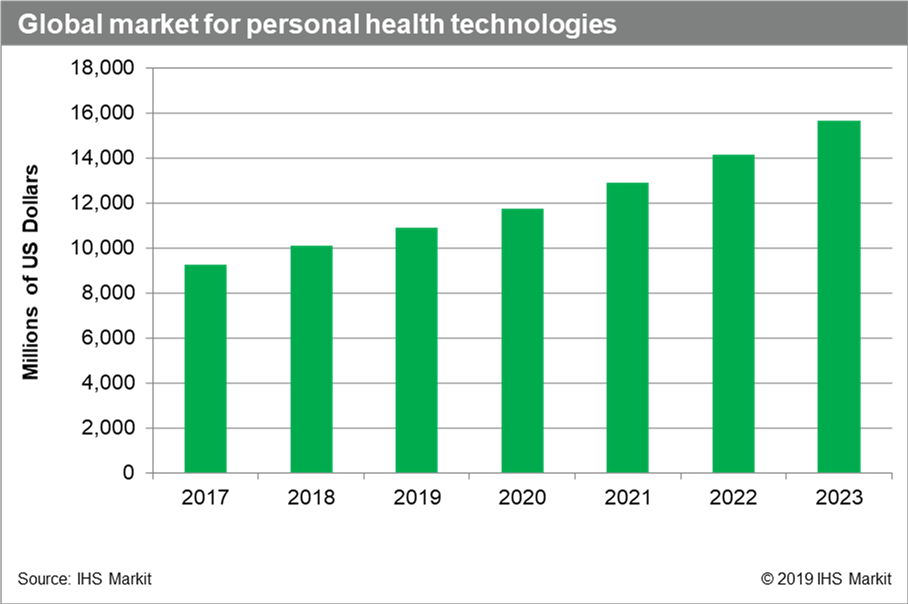Personalised technology driving $5bn growth wave in personal health device market, IHS Markit says

Roeen Roashan of IHS Markit
Imagine a smart monitor that advises users how to get a better night’s rest based on observations of sleep habits and bedroom conditions. Now envision a hearing aid that can calibrate itself to address an individual’s specific auditory needs. Then picture a diabetes monitoring system that actively helps patients manage diet, activity and medication.
These are all examples of a new generation of personalised health devices now entering the market. Such innovative products go beyond the quantified self to embrace the so-called “enhanced self”—not just logging medical signs and symptoms, but actually assisting users in managing their individual needs to improve their overall health, says Roeen Roashan, senior analyst, digital health, IHS Markit.
Personalisation will be a primary driver of the next wave of growth of the personal health technology device market, causing global revenue to grow by nearly $5 billion (€4.4 billion) during the next five years, reaching a total of more than $15.7 billion (€13.8 billion) in 2023, up from $10.9 billion (€9.6 billion) in 2019, according to the latest research from the IHS Markit Digital Health Intelligence Service.
“Over the past decade, the personal health monitoring business has built itself into a multibillion-dollar market based on the notion of improving health by quantifying individual users’ physiologies,” said Roeen Roashan, senior analyst, digital health, at IHS Markit.
“However, the industry now has new mantra: personalisation, a major shift enabled by advancements in hardware and software technology and the integration of medical devices with the smartphone ecosystem. Personalisation transforms the quantified self into the ‘enhanced self,’ bringing effective self-care to every individual, and eliminating the practical limitations and social ramifications of disease or disability.”

Personalisation delivers a better night’s sleep
One area where personalisation is enabling self-care is the field of sleep enhancement. The issue of insomnia is significant, as more than one-third of adults suffer from sleep deprivation. Since 2017, sleep tracking has made its way into the hands of consumers, in most cases through highly inaccurate wearable devices that provide no value.
However, SleepScore Labs—part of ResMed—has taken a different approach, offering a multipurpose non-contact monitor that tracks the sleep environment and quantifies sleep patterns. These inputs are combined into a platform that delivers personalised feedback and suggestions on how to enhance sleep. These include recommendations on lighting, room temperature, mattresses and more.
Hearing earbuds get smarter
Another example of effective self-care is Nuheara’s smart hearing earbuds.
In contrast to personal sound amplification products (PSAPs), which offer little to no personalisation, Nuheara’s IQBuds interface allows users to establish a unique hearing profile called Ear ID. Sound amplification, noise reduction and other features of smart hearing are then modified to fit each individual’s Ear ID profile.
The IQBuds are not comparable to medical-grade hearing aids but are effective in providing residual hearing to people suffering from mild-to-moderate hearing loss. What cements Nuheara’s efforts in this space is the U.S. Food and Drug Administration’s (FDA) new law covering over-the-counter (OTC) hearing aids, which will be finalised in 2020.
Under pending FDA regulation, the IQBuds and comparable products will not require a prescription from an audiologist or other healthcare professional. Nuheara and other smart hearing companies, including Bose, are well positioned to lead the OTC hearing aid space, which IHS Markit expects to expand to more $600 million (€530 million) globally in 2023.
Taking on diabetes with personalisation
While self-care effective and efficient, it is only possible with low-risk aspects of personal health. Other conditions, such as diabetes or various cardiovascular diseases require management by a healthcare provider, but that does not diminish the value of personalisation features.
In diabetes management, new products available in the short-term will deliver low-cost continuous monitoring that will enhance the value of diabetes management platforms such as mySugr and Glooko. They also will allow users to better manage medication, diet and activity.
AI technologies boost personalisation
For other consumer diagnostic tools, machine learning and natural language processing technologies are enhancing the user experience by helping users understand spot measurements and trends. This again represents a level of personalisation that increases the value of self-monitoring or self-care. These technologies apply to consumer diagnostics in general and include blood pressure monitoring, ECG monitoring, body temperature readings and more.
Big data from personalisation
As heath technologies catering to the consumer become increasingly personalised, data generation will grow exponentially. Making meaningful use of this data remains challenging, although circumstances are improving. Apple’s health records are now supported at more than 250 health institutions in the United States, which is no small accomplishment. As personal health tech companies utilise the smartphone as the gateway device to bring everything together, the meaningful use of consumer-generated data will increase dramatically in the years to come.
Personalisation will continue to increase the value of personal health products. And although still nascent, the impact of personalisation will be obvious both short-term and in the long-term.
The author of this blog is Roeen Roashan, senior analyst, digital health, IHS Markit
Comment on this article below or via Twitter @IoTGN
